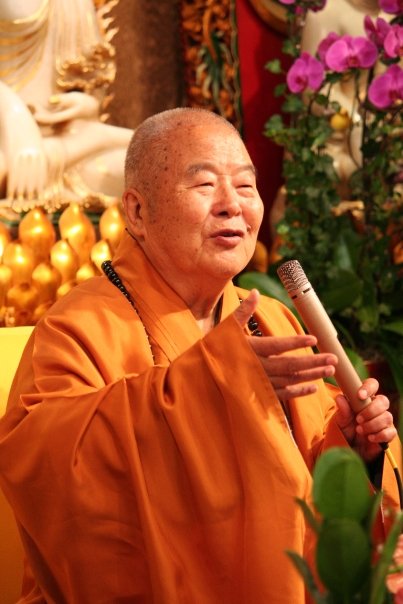by Brian Hioe
語言:
English
Photo Credit: Huicheng1967/WikiCommons/CC BY-SA 4.0
A CROSS-STRAIT political spat has broken out following the death of prominent Buddhist monk Hsing Yun, the founder of Fo Guang Shan. Fo Guang Shan is one of Taiwan’s major humanistic Buddhist organizations, sometimes referred to as the “Four Mountains.” These consist of Dharma Drum Mountain, Fo Guang Shan, Tzu Chi, and Chung Tai Shan.
Hsing Yun died at age 95, though he had been mostly out of the public spotlight for the past decade due to poor health, and suffering several strokes. His funeral earlier this week was an occasion attended by major political luminaries in Taiwan ranging from KMT chair Eric Chu and President Tsai Ing-wen, as well as Premier Chen Chien-jen. Kaohsiung mayor Chen Chi-mai and Minister of the Interior Lin Yu-chang, both of the DPP, were also in attendance. It was expected that 30,000 would attend the funeral ahead of time, with the majority of attendees watching the proceedings on video screens set up outside Fo Guang Shan’s Cloud Dwelling Building. A procession also carried Hsing Yun’s remains around the grounds.
 Hsing Yun in 2009. Photo credit: Iamwisesun/WikiCommons/CC BY-SA 2.0
Hsing Yun in 2009. Photo credit: Iamwisesun/WikiCommons/CC BY-SA 2.0
The cross-strait political spat, however, occurs because a 38-member delegation sent from the PRC that would have included Taiwan Affairs Office Deputy Director Long Mingbiao, Chinese State Administration for Religious Affairs director Ye Xiaowen, representatives of Chinese Buddhist organizations, and other religious affairs officials was not allowed to enter Taiwan for the funeral. China has hit back at this move as restricting religious freedoms.
For its part, the Tsai administration has stated that 120 Chinese nationals were allowed to travel to Taiwan for the funeral, including individuals from Hong Kong and Macau. This includes worshippers, friends, and relatives of Hsing Yun. Later on, the Tsai administration a visit to Taipei by Shanghai government officials for the lantern festival. Likewise, the Tsai administration has framed its actions as primarily procedural in nature. Reportedly, the Chinese officials did not apply with the Mainland Affairs Council to visit Taiwan, as would be expected, but only conveyed their intention to visit Taiwan through the Fo Guang Shan.
Part of the contention is regarding Hsing Yun’s own politics, as well. Hsing Yun historically favored the KMT politically, though he later proved supportive of Tsai, referring to her as an incarnation of Mazu. Likewise, Hsing Yun reportedly was involved in helping former Xinhua director Xu Jiatun flee to the US, and called for Beijing to make amends with the Dalai Lama.
Organized religion proves another arena of contestation where cross-strait politics is concerned. For example, the worship of the sea goddess Mazu is common in Taiwan. The two major Mazu pilgrimages, however, the Baishatun Mazu pilgrimage and the Dajia Mazu pilgrimage, have different political orientations. The former slants more toward the pan-Green camp while the latter slants more toward the pan-Blue camp, with the head of the Dajia Jenn Lann Temple being former KMT legislator Yen Ching-piao, who is also known to have organized crime ties.
To this extent, as Mazu is originally a deity from China and many temples in Taiwan are originally branches of temples from China, the Dajia Mazu pilgrimage has positioned its temple as subordinate to its Chinese counterparts. It may not be surprising, then, that China carries out United Front activity by way of such religious organizations.
Post by KMT chair Eric Chu regarding Hsing Yun’s passing
The Falun Gong, however, has praised the Tsai administration’s decision to ban Chinese officials from traveling to Taiwan. Namely, Ye Xiaowen played a role in the persecution of the Falun Gong in China.
Indeed, the Mainland Affairs Council also justified turning down the visit on the basis that it would be socially disruptive, potentially leading to protests against Ye or other officials. It would be probable that, as with other incidents of Chinese officials visiting Taiwan, this would have led to protests from pro-independence groups.
Either way, it would not be surprising if the KMT uses the incident to attack the Tsai administration and DPP, too. Hsing Yun’s funeral takes place at the same time as a visit to China by vice chair Andrew Hsia. The KMT will likely continue to frame itself as the only political party in Taiwan able to conduct communications and maintain stable relations with the CCP, while framing the Tsai administration’s actions as unnecessarily provocative of China. A visit by a Chinese religious delegation would be framed as an olive branch gesture and Tsai will be framed as acting on ideological pro-independence aims in turning it down.

